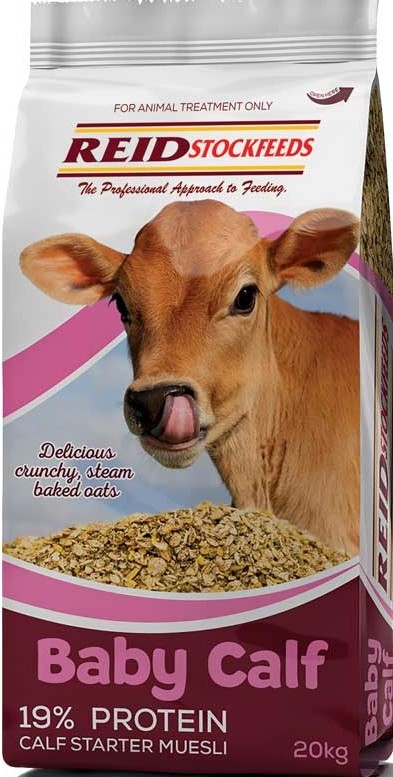



Give your baby calves the best start in life with a high quality calf starter.
With a balanced vitamin and mineral profile, baby calf feed from Reid Stockfeeds improves the immune system and encourages healthy growth.
The smell, flavour and texture of our nutrient-rich ‘muesli’ is designed to appeal to newborn calves so they quickly accept a diet of grain and solid food.
Baby Calf Muesli from Reid Stockfeeds is cleverly created to entice curiosity. With molasses and calf-friendly flavours, it sticks to wet noses to introduce calves to the concept of solid food.
After a few licks, calves become used to eating solid foods. They then find it easier to move on to feeding from troughs.
The texturised, consistently high-quality grain in our calf starter helps to develop the rumen papillae and absorptive surface area, while the fibre content assists with the muscular layer of the rumen.
Follow these instructions to make the most of your baby calf feed:
• Feed Reid Stockfeeds baby calf starter unrestrictedly pre-weaning, and post-weaning if desired.
• As well as specially formulated muesli, calves should always have access to fresh, clean water and high-quality fibre such as barley straw.
• Fresh feed should be distributed to calves daily to minimise the chance of it becoming stale or contaminated.
• Calves should continually increase their intake of all feeds and water.
• Diet changes should be made gradually.
• Changes to milk volume should be limited to 1/2 litre per feeding.
• Target growth rates vary by breed, however 600-800 grams of weight gain per day is the expected average.
Our baby calf feed is suitable for the first 12 weeks of a dairy cow’s life.
Day 1 – Ensure the calf receives adequate colostrum. Aim to feed 10% of its weight in colostrum within the first 24 hours of life, in two separate feeds. Introduce small amounts high-quality roughage (e.g. barley straw) and allow unlimited access Reid Stockfeeds Baby Calf from Day 1.
Day 2 – 5 – In the first days of life, milk intake should reach 12% of live weight (assuming that whole milk is being fed). This may be split into two feeds a day, morning and afternoon.
Week 2-3 – Continue to feed 12% of live weight as milk, split into two feeds a day. Combine Reid Stockfeeds’ Calf Rearer with Reid Stockfeeds Baby Calf, progressively increasing the Calf Rearer to 100% by the end of the third week of the calf’s life.
Week 4-9 – Ensure concentrate intake is steadily increasing. Forage intake should also be increasing.
Week 10+ – Gradually reduce milk intake over a two week period. During this time, grain and water intake should be continually increasing.
Week 12 – Continue to feed forage and Reid Stockfeeds Calf Rearer or Calf Weaner until the calf reaches 200kg.
Access to fresh clean water is essential for calves. Drinking regularly also encourages the early consumption of muesli/grain.
When feeding baby calves, choose a fibre source that is different to the calf bedding material so your calves are not tempted to eat bedding (doing so can lead to illness).
The fibre calves ingest should not make up more than 10% of their diet during the pre-weaning period. Eating too much hay will slow down digestion and result in a loss of appetite. The impact of this is a slowdown in growth rates.
